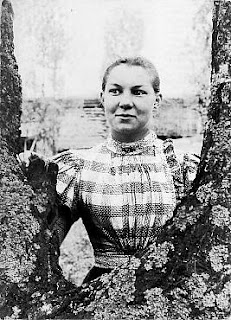L Onerva was an amazing person, the sort of woman about whom books are written because she's so unusual. All in Finnish, though, but perhaps it's time for a change as Onerva is the kind of genuine feminist icon we need to know about.
Born Hilja Lehtinnen in Helsinki in 1882, she was effectively an orphan by age 7, when her mother was locked up in an asylum for the insane, where she lived on for 40 years. With this in her background, Hilja wasn't hindered. She went off to university, graduating in 1902. She was married for a while to a man who had a home in Karelia, the Finnish heartland. Onerva's problem wasn't how to express her creativity, but which of her many talents to pursue. She was a gifted writer, drawn to poetry, journalism, novels and theatre, a genre pioneered by other women playwrights like Minna Kanth (1844-1897)
Onerva's first collection of poems was published in 1904. Fiery, exotic poems, which shocked many, coming from a young and respectable woman "But once within a lifetime opens a fiery rose, that for but one night blossoms and in the morning goes... "It has a leaf all bloody; it has a purple lip, it has a dizzy fragrance like spring winds on the steppe." Life followed art. Onerva went off to live in Rome with the poet Eino Leino, though both were married to others., When Leino didn't treat Onerva right, she dumped him and returned to Helsinki alone. She pursued an independent career as a novelist and wrote for Helsinki newspapers. Apparently she specialized in "New Women", creative and lively individualists like herself.
She had a friendship with Toivo Kuula, who set her poems, but was killed in a shocking accident during the Finnish war of Independence in 1918. She married Leevi Madetoja (1887-1942) but it didn't work out. He had her confined in an asylum - like her mother - but luckily (for her) he died five years later and she was released. She lived to be 90, writing prolifically to the end. Not an easy life, no money or leisure, but being a true artist, Onerva was driven to defy the odds against her.
Many of Onerva's poems have been turned into song, but perhaps the finest is a song cycle by Madetoja, Syksy-saja, or Autumn Song. It's an excellent cycle and really should be better known. There are at least four recordings. Recommended are Karita Mattila and Helena Juntinnen. If I have time, I'll write more about it, but give it a listen.
Born Hilja Lehtinnen in Helsinki in 1882, she was effectively an orphan by age 7, when her mother was locked up in an asylum for the insane, where she lived on for 40 years. With this in her background, Hilja wasn't hindered. She went off to university, graduating in 1902. She was married for a while to a man who had a home in Karelia, the Finnish heartland. Onerva's problem wasn't how to express her creativity, but which of her many talents to pursue. She was a gifted writer, drawn to poetry, journalism, novels and theatre, a genre pioneered by other women playwrights like Minna Kanth (1844-1897)
Onerva's first collection of poems was published in 1904. Fiery, exotic poems, which shocked many, coming from a young and respectable woman "But once within a lifetime opens a fiery rose, that for but one night blossoms and in the morning goes... "It has a leaf all bloody; it has a purple lip, it has a dizzy fragrance like spring winds on the steppe." Life followed art. Onerva went off to live in Rome with the poet Eino Leino, though both were married to others., When Leino didn't treat Onerva right, she dumped him and returned to Helsinki alone. She pursued an independent career as a novelist and wrote for Helsinki newspapers. Apparently she specialized in "New Women", creative and lively individualists like herself.
She had a friendship with Toivo Kuula, who set her poems, but was killed in a shocking accident during the Finnish war of Independence in 1918. She married Leevi Madetoja (1887-1942) but it didn't work out. He had her confined in an asylum - like her mother - but luckily (for her) he died five years later and she was released. She lived to be 90, writing prolifically to the end. Not an easy life, no money or leisure, but being a true artist, Onerva was driven to defy the odds against her.
Many of Onerva's poems have been turned into song, but perhaps the finest is a song cycle by Madetoja, Syksy-saja, or Autumn Song. It's an excellent cycle and really should be better known. There are at least four recordings. Recommended are Karita Mattila and Helena Juntinnen. If I have time, I'll write more about it, but give it a listen.

No comments:
Post a Comment